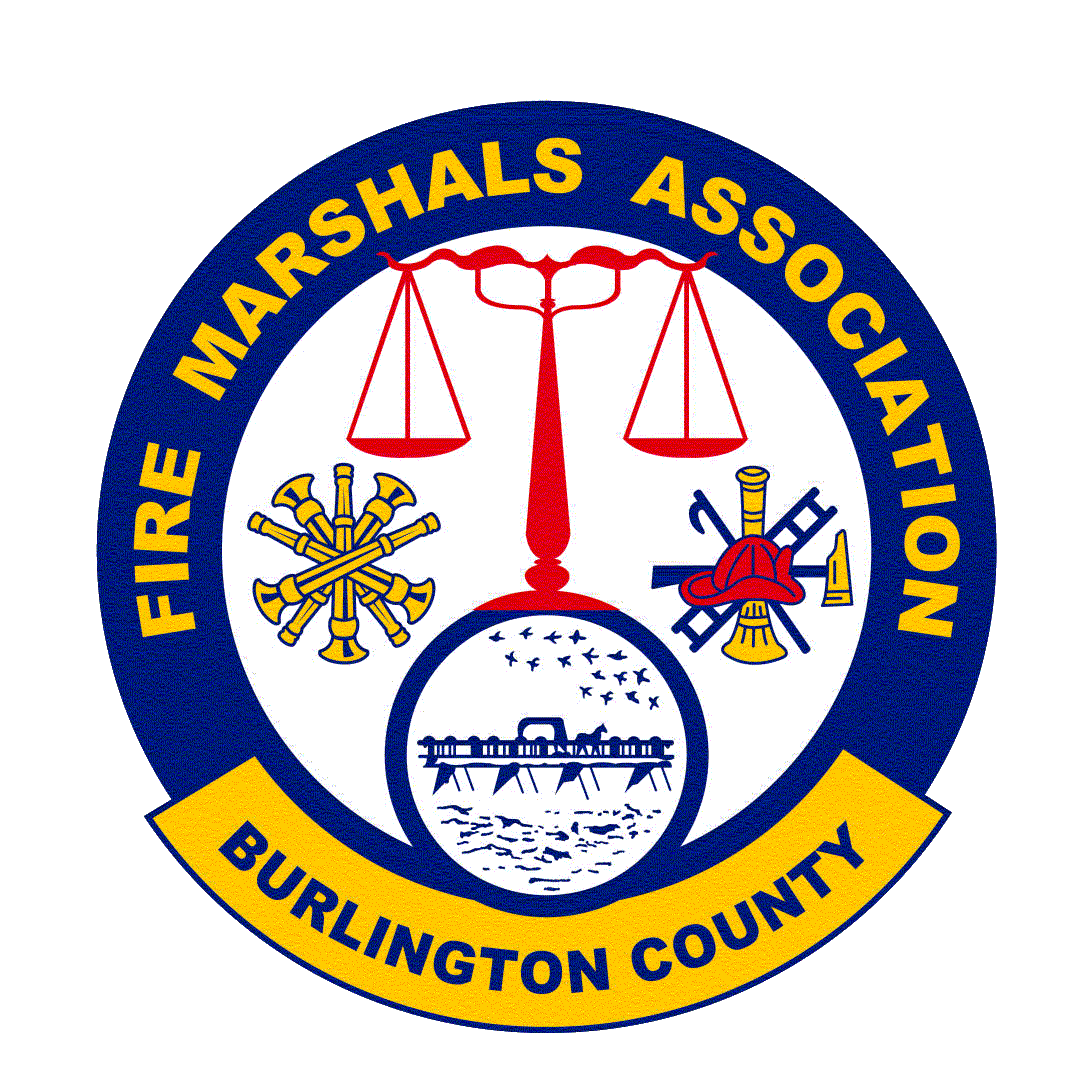
Burlington County Fire Marshals' Association


Welcome to the Burlington County Fire Marshals' Association Web Site.
Look below or to the menu to the left for anything we can help you with.
Mission Statement:
The Mission of the Burlington County Fire Marshals' Association is to preserve life and property from Fire, Explosion and other related hazards through Fire Prevention, Safety Education, Code Enforcement, and Fire investigation.
![]()
“Safely Decorate for the Holidays Fire Prevention Tips” on Daytime
Proper Smoke Detector Disposal
| Replacing old smoke detectors is a key part of fire safety, but knowing how to properly dispose of old or expired smoke alarms and fire extinguishers is also important. Some fire detectors and extinguishers can contain hazardous materials that need to be disposed of with care. |
|
How to Dispose of Smoke Alarms
|
Note that fire alarms should not be recycled. For more information about your specific alarm, refer to your user's manual.
How to Dispose of a Fire Extinguisher
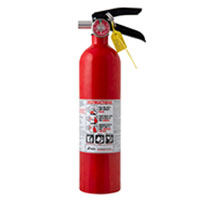 Fire extinguishers and propane tanks and dispose of them safely. To find a fire extinguisher disposal center near you, search on Earth911.com. These facilities can typically also accept other hazardous waste like paint, batteries, cleaning products, and other items.
Fire extinguishers and propane tanks and dispose of them safely. To find a fire extinguisher disposal center near you, search on Earth911.com. These facilities can typically also accept other hazardous waste like paint, batteries, cleaning products, and other items.If you have any concerns or doubts, we recommend contacting your local fire department to verify compliance with any jurisdictional ordinances or requirements before disposing of smoke detectors, heat alarms, carbon monoxide alarms, and fire extinguishers.
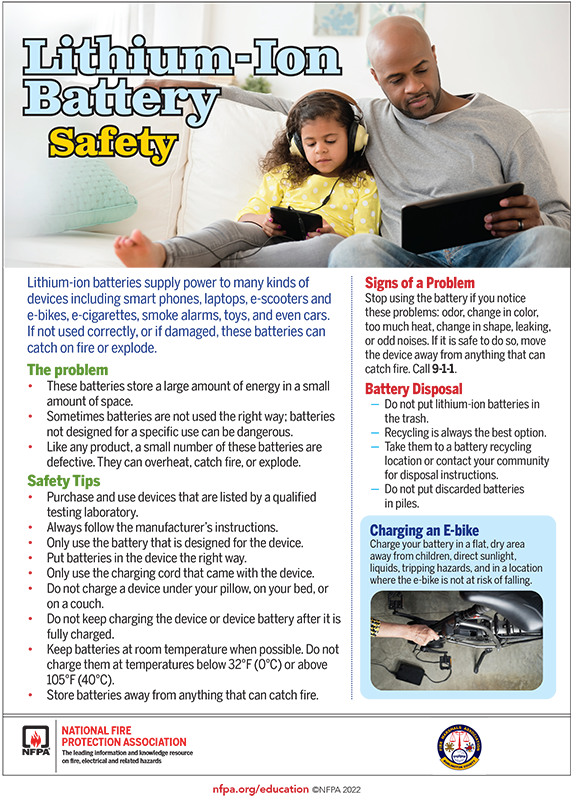 |
VR Home Fire Demonstration - Unsprinklered and Sprinklered (room with no sprinkler first)
Space heaters are a popular appliance to provide additional heating at home, but can cause a significant fire hazard when placed too close to flammable materials. Chimneys and heating systems should be inspected and cleaned each year before they are fired up for the season.
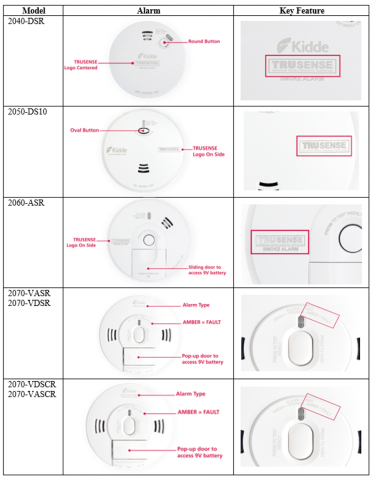
Recall Details
Description:
This recall involves Kidde TruSense Smoke Alarms and Combination Smoke/Carbon Monoxide Alarms. The recalled units are Kidde Model Series 2040, 2050, 2060 and 2070 Smoke and Combination Smoke/Carbon Monoxide alarms. Only alarms with the TruSense logo or “AMBER=FAULT” printed on the front of the alarm are included in this recall. The model number is printed on the back of the alarm.
| Model | Alarm Type |
| 2040-DSR | Smoke |
| 2050-DS10 | Smoke |
| 2060-ASR | Smoke |
| 2070-VDSCR | Combination Smoke/Carbon Monoxide |
| 2070-VASCR | Combination Smoke/Carbon Monoxide |
| 2070-VDSR | Smoke |
| 2070-VASR | Smoke |
Remedy:
Consumers should immediately contact Kidde for a free replacement alarm. Consumers should keep using the recalled alarms until they install replacement alarms.
Incidents/Injuries:
No incidents or injuries have been reported.
Sold At:
Walmart, Home Depot, Menards and other department, home and hardware stores and electrical distributors nationwide, and online at Amazon.com, ShopKidde.com and other online retailers from May 2019 through September 2020 for between $10 and $70.
Importer(s):
Walter Kidde Portable Equipment Company Inc., of Mebane, N.C.
Manufactured In:
China
Recall number:
21-130
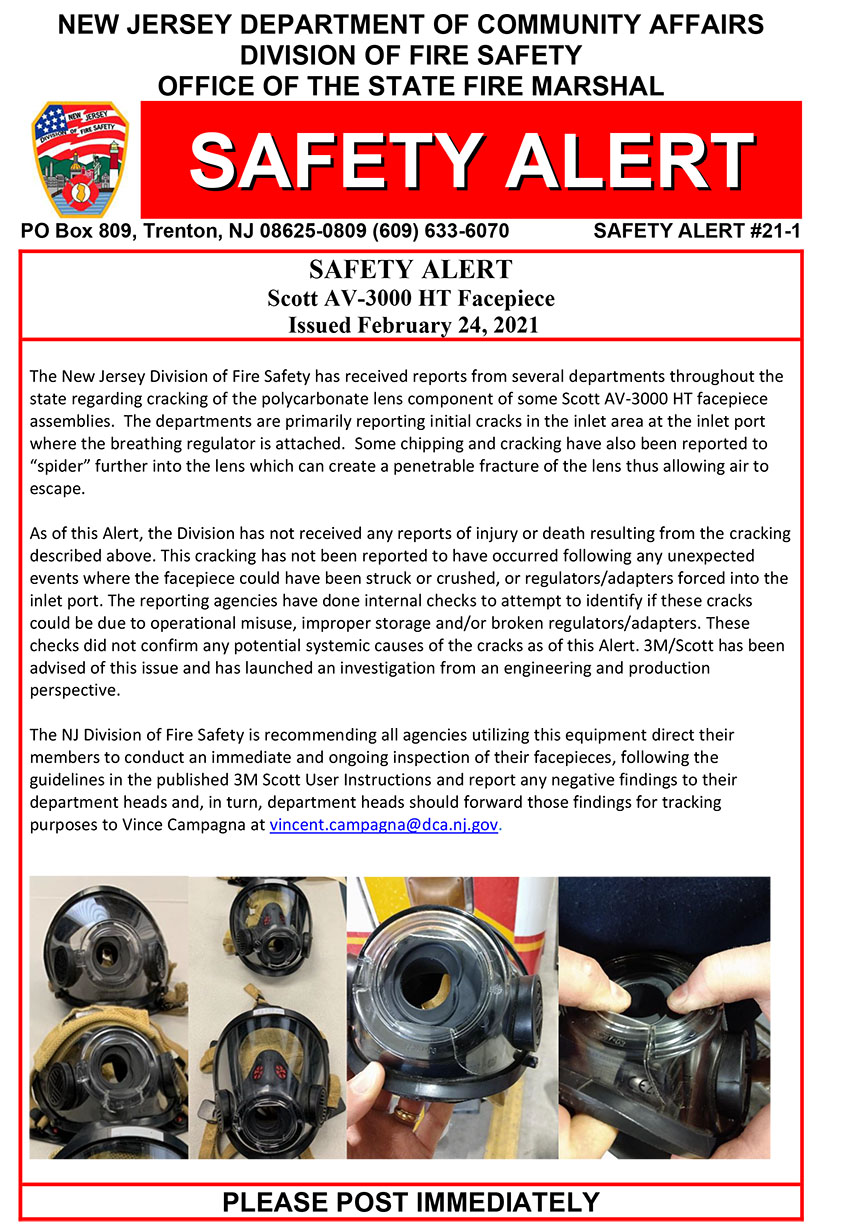
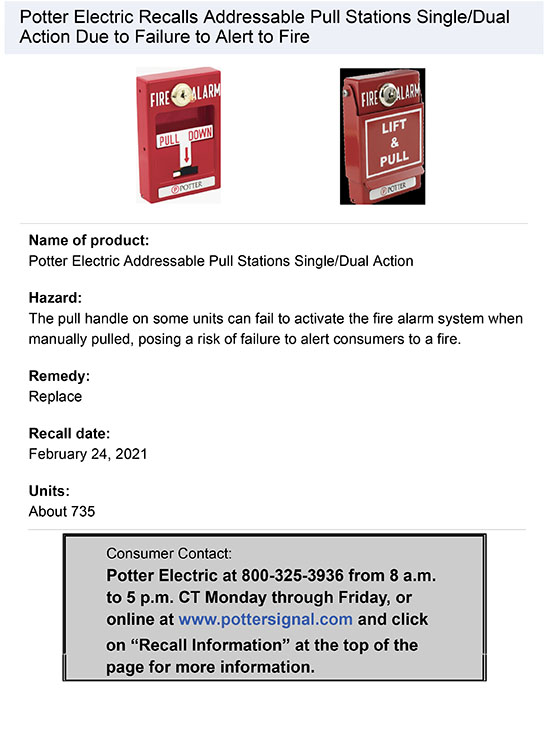
The National Fire Protection Association (NFPA) is reminding you to make sure you have enough smoke alarms in your home, test them monthly and replace them every 10 years.
Effective January 1, 2019 Throughout New Jersey ALL Battery Smoke Detectors MUST Be 10 Year Sealed Battery Units
SMOKE DETECTOR INSPECTIONS FOR RENTAL OR RESALE INSPECTIONS
NEW JERSEY STATE FIRE CODE UPDATE: 5:70-4.19(a)
"In one- and two-family or attached single family dwellings subject to the requirements of N.J.A.C. 5:70-2.3, (inspection for rental or resale) smoke alarms
shall be installed with a ten-year sealed
battery-powered single station smoke alarm."
This does not apply to new construction.
Interconnected smoke detectors will be checked for manufacturer’s specifications to indicate the life of the smoke or carbon monoxide detectors.
This includes hard-wired smoke detectors also.
CPSC: Checklists for Keeping Your Home Safe During COVID-19
During these times of uncertainty, you want your home to be a safe place for you and your loved ones. Especially now, when you are spending so much time indoors, you need to be able to identify and handle the hidden hazards in your home that can cause injury or death. Just as you are working to protect those you love from COVID-19, CPSC urges you to protect your family from these hazards as well.
CPSC continues to protect the public from dangerous consumer products through science, investigation, corrective action and communication. In response to the current crisis, CPSC has created a series of Home Safe Checklists, whether your home has babies, teens or seniors—or all of them. Print the lists that work for you, and spend a few moments checking off the safety items. When so much in the world seems beyond control, these checklists are simple, clear steps you can take for the safety of your family.
Home Safe with Young Children
Home Safe with Older Children
Home Safe with Seniors
Home Safe for Everyone
https://www.cpsc.gov/Safety-Education/Safety-Education-Centers/covid-19-home-safety
 |
According to the National Fire Protection Association, 15,970 home fires a year involve clothes dryers or washing machines. Ninety two percent of those fires were due to the dryer.
From 2010-2014, those fires resulted in 13 deaths, 440 injuries and $238 million in direct property damage.
“The leading items first ignited in dryer fires were dust, fiber or lint (26% of total) and clothing (26%), while items first ignited in washing machine fires were part of the appliance itself,
including wire or cable insulation (26%), appliance housing or casing (24%), and drive belt (11%),” a report by NFPA states.
Here are some tips from NFPA:
The U.S Fire Administration reports,” more home clothes dryer fires occur in the fall and winter months, peaking in January.”
Rossen Reports Update: How to Use a Space Heater Safely
Space heaters are popular devices for a number of reasons: They're small, cost efficient and can keep your family warm.
But it turns out, many people use them incorrectly and in an instant, tragedy can strike.
Why You Have Less Time to Escape a House Fire Today than 30 Years Ago
Research shows that 30 years ago, you had about 17 minutes to escape a house fire.
Today, you have only 3 or 4 minutes.
TODAY national investigative correspondent Jeff Rossen conducts a dramatic demonstration that
shows why, and how you should prepare.
Fire safety checklist for homeowners and renters
Why You Should Not "TRUST THE TRUSS"
Study Finds Firefighter Cancer Rates Have Increased
Running toward burning buildings is a risk firefighters face daily. But the true cost of the job could appear years later, reports USA Today.
Firefighters have higher rates of cancer than the rest of us, according to a recent study by the National Institute of Occupational Safety and Health. Cancers of the respiratory, digestive and urinary systems account for much of the reported cases, the study found.
New Jersey Division of Fire Safety Fire Focus
New Jersey Division of Fire Safety – Community Risk Reduction Videos
Fire Inspectors: Still Trustworthy
Recently people impersonating Fire Inspectors have been in the news. These people have given the profession of Fire Inspecting a bad name. They have utilized the title and in some cases the uniform to gain entry into an establishment. When in these establishments they would steal items or charge for the service they were supposedly performing.
The Burlington County Fire Marshals Association which represents Fire Marshals and Fire Inspectors from throughout Burlington County would like to make it clear that a Fire Inspector is still a trustworthy individual. A Fire-Inspector is very professional and cares about what he/she does and the community in which they serve. To become a Fire-Inspector one must obtain a license through the State of New Jersey. He/she must attend continuing education classes on a regular basis. Fire-Inspectors are dedicated to their profession and their communities.
The Burlington County Fire Marshal Association has listed a few items below to help safeguard against these impersonators.
Know Your Inspectors:
Most Fire-Inspectors will be wearing a uniform or something with the agencies name on it. Just because they have a uniform on don’t assume they are who they say they are.
- All Inspectors (Fire, Building, Electrical, Plumbing and Water Dept.) will have a picture identification card on them at all times. This card will have their name and department as well as a contact number. If you have any doubt, contact your municipal office before allowing access.
- A Fire-Inspector must have his/her Inspector license with them; don’t be afraid to verify this with their ID tag or Driver’s License.
- A Fire-Inspector would never come to any type of residential home without being scheduled to do so.
- A Fire-Inspector is required to give you a certificate or a violation notice with the date in which he/she performed the annual inspection. If you have any doubt about the timing of the inspection; thinking the Inspector was just there, then just check this paperwork and the date. As mentioned these inspections are annual with the exception of a few.
- In most cases a Fire-Inspector will not take any kind of payment in the field. If he/she does it should be in the form of a check, made out to the agency in which they are performing the service for.
- Maintenance on Fire Extinguishers, Alarms, and Sprinklers are typically scheduled annually by a private company. Check the tags or previous bill to see when they were last performed. When in doubt, contact the company to verify someone should be out there. These services being performed are billable; never pay cash if you are unsure.
Most departments go through great lengths and expenses to ensure that their Inspectors are identified; you are not inconveniencing them by asking for this information.
If you should have any questions contact your local Fire Prevention Office or go to our web site www.bcfma.org
![]()
M![]()
![]()
Burlington County
Fire Marshals'
Association Officers
President: Steve Woods - president@bcfma.org
Vice President: Lee Park - vice_president@bcfma.org
Secretary: Joe Cunningham, Jr. - secretary@bcfma.org
Treasurer: Randy Johnson - treasurer@bcfma.org
Trustee: TBA
Trustee: TBA
Trustee: TBA
To
e-mail the webmaster: webmaster@bcfma.org
© Copyright 2024,
Burlington County Fire Marshals' Association